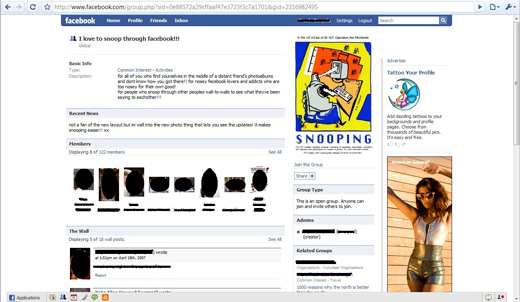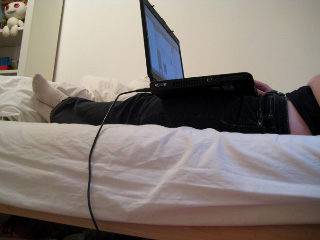Click. Laura Norton scans a stranger’s photo album. Click. Santhoshi Doshi reads that one of her friends has changed jobs. Click. Ana Robic discovers that the classmates who annoyed her at school still hang out with one other.
The three women are peeping into Facebook pages of friends and strangers. They are Facebook snoops.
There’s nothing wrong with it — after all, those who post know that information is out there for all the world to see.
But checking out people online has a deliciously furtive feel.
“Snooping” means browsing the messages, pictures, and videos of people who don’t restrict their Facebook pages.
Just click and enjoy.

It’s easy to be nosy
“Snooping on Facebook is a result of the way the information is presented to us, the ease of access and the visual aspects of information,” said Jeff Ginger, a sociologist working on a study called “The Facebook Project.”
Anonymity, in other words, abets.
“It’s gossiping, but without any blame,” admitted snooper Santhoshi Doshi, a business intelligence expert in Mountain View, California, who likes to look at people’s wedding albums on Facebook. “You’re free to look at stuff that you generally might not look at.”
Snooping is so popular that there are more than 150 Facebook groups with names such as “I am a proud Facebook snooper,” “People who snoop on other people through Facebook,” and “I’m a Facebook snoop and not afraid to admit it!”
“Why did he friend his ex?”
Since people voluntarily upload their pictures, videos, and information, realizing that anyone can see, why does rolling through strangers’ pages seem slightly sleazy?
Sociologist Ginger says it’s because one can get information impossible or uncomfortable to get in person.
“If you ask someone if they’re dating in person, you unleash a whole barrage of implications. But if you look at this on Facebook, you answer your question without all of the fallout.”
And so, when Courtney Jones, a waitress from Norman, Oklahoma, is interested in a boy, her first step is to review his Facebook page.
“When I look at a page, I read into what is on there. Like if a guy is in a picture that alludes to something sexual with a girl, I assume that if they’re willing to be that open with their sexual life in front of the camera, I’m sure they’re willing to do more behind the camera,” she says.
Jones also snoops on behalf of her friends, especially when they start dating new people.
“I’ll go through his Facebook word for word, and see if he has anything I wouldn’t approve of. Pictures, wall-to-wall, everything. I gotta have my girls’ backs!”
Mirror, mirror on a Facebook wall
While it does seem that we snoop because we’re curious about those around us, it has more to do with our need to know ourselves, suggested Shanyang Zhao, a sociology professor at Temple University.
“Getting to know others is important for the purpose of getting to know ourselves, for others serve as a looking glass in which we see ourselves,” said Zhao, who specializes in Internet and human interaction.
Maybe this explains why Ana Robic, a foreign language student from Brussels, snoops on classmates who were mean to her in high school. Robic belongs to a 108-member Facebook group called “Facebook helps me spy on people I don’t like.” Said Robic: “I look for something that shows me that I have a better life, so that I can say, ‘I don’t like you and look, I’m better than you are!’”
Zeeshahn Zafar, a public relations manager from Dubai, United Arab Emirates, snoops to gauge her popularity — or lack thereof.
“I read messages that other people have posted on that person’s wall. If a person has not replied to my messages, I check to see whether he or she has replied to other people’s messages.”
If you’re ignoring someone on Facebook, then you’d better have a good excuse.

“You look familiar”
Zhao argued that Facebook snooping will make communication more subtle, sophisticated, stylish, and “further differentiated based on personality, age, education, class, among other things.” But he also acknowledged that it keeps people from talking — or gossiping — with each other as much.
“I don’t talk on the phone as much as I used to with my friends,” Norton agreed. “And even when we do talk, I might say something and my friend will talk about how she knew about it through Facebook. It’s pretty ridiculous.”
There’s also such a thing as too much information.
“I sometimes meet new people at a party, maybe friends of a friend, and they seem familiar,” Doshi said. “And then I realize that I’d snooped on them through a friend’s Facebook page. I have to bite my tongue to keep myself from blurting that out.”
- Follow us on Twitter: @inthefray
- Comment on stories or like us on Facebook
- Subscribe to our free email newsletter
- Send us your writing, photography, or artwork
- Republish our Creative Commons-licensed content

